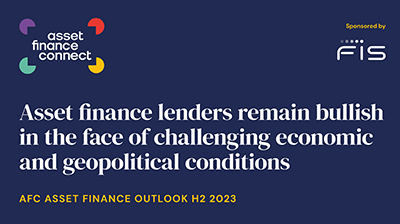
Two years of soaring inflation, the highest interest rates since 2009, soaring energy costs due to conflict in Ukraine and the Middle East, plus a general election on the horizon have reduced the appetite for SMEs to invest. The IMF has downgraded its 2024 forecast for UK growth to 0.6%, the lowest in the G7, and lenders are already facing higher credit risks and rising defaults.
Amid this gloomy outlook, however, the asset finance industry is optimistic (in public at least), according to Asset Finance Connect’s inaugural Asset Finance Outlook report for H2 2023, sponsored by FIS. Historically, when the lending market gets tough, asset finance thrives, supporting SMEs when other lenders withdraw.
In September 2023, Asset Finance Connect carried out the first in a new half-yearly asset finance confidence survey designed to gauge market sentiment for the next six months among leading asset finance providers. Respondents were exclusively selected from companies that serve the SME community.
The survey found confidence in both the appetite to borrow among SMEs and the appetite to lend among asset finance lenders and brokers, although there appears to be a disconnect between bullish language and the difficulties that some SMEs are experiencing in their attempts to access finance.
Key findings are:
Demand: Lenders have more confidence than brokers in SME demand for borrowing. Overall, 25% (the percentage who think SME borrowing appetite will increase minus the percentage who thing it will decrease) of lenders forecast growth in demand, compared to a score of -16.7% for brokers.
Appetite to lend: Captives and independents have an opportunity to win market share from banks, with the AFC survey finding significant divergence in appetites to lend. On balance, banks received a negative score of -21% for their appetite to lend, plunged lower by a -50% mark from brokers, but captives and independents both received positive overall scores of 33% and 42% respectively.
New business volumes: Company cars, commercial vehicles and plant and machinery are forecast to drive new business volumes over the next six months, with the AFC survey finding SMEs more likely to invest in assets that deliver a return. The cost-of-living crisis, however, is hitting consumer demand for cars, while businesses appear less inclined to invest in office equipment, a reflection perhaps of new hybrid working practices.
Green asset funding: Lenders are far more bullish than brokers about the prospects for new business volumes from ‘green’ assets as SMEs adopt environmental agendas, according to the AFC survey. This growth opportunity does, however, come with challenges around cost, uncertainty surrounding the lifecycle of green equipment, and significant residual value risk.
Cost of funds: The cost of funds is forecast to increase substantially (77.78%), according to AFC survey respondents, while the availability of funds is expected to increase only marginally to moderately (wholesale 12.50%, block 28.57%).
Operating expenditure: A series of inescapable business headwinds are driving up operating expenditure, with lenders facing higher staff recruitment and retention costs, increased compliance costs, rising prices for investments in technology, as well as the impact of more bad debts.
Risk: The credit risk appetite among lenders, and especially brokers, is in sharp decline as a variety of threats looms. The AFC survey identified substantial increases in the number of defaults, the danger of SMEs going into administration, and concern over residual value exposure (particularly for untested green equipment). On balance, the industry views compliance risk at 50%, with suggestions that some lenders will simplify their business processes by abandoning regulated products.
Download the AFC Asset Finance Outlook H2 2023 report, sponsored by ![]() , now by completing the form below.
, now by completing the form below.







